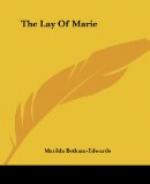* * * * *
No. III.—LAY LE FRAINE.
This ancient and curious little poem, translated from the French of Marie, is preserved in the Auchinlech MSS. It was communicated by Mr. Walter Scott to Mr. Ellis, and is inserted amongst his Miscellaneous Romances. It is mutilated in two places, and wants the conclusion. These defects are supplied from the French prose.
The prologue begins by observing, that in ancient times, lays, intended to be accompanied by the harp, were composed on all sorts of subjects.
Some both of war,
and some of woe;
And some of joy and mirth
also;
And some of treachery and
of guile;
Of old aventures that fell
while;
And some of bourdes[33]
and ribaudy;
And many there beth of fairy;
Of all thinges that men seth,
Most of love, forsooth, there
beth.
In Bretayne, by old time,
These lays were made, so sayeth
this rhyme, &c.
The Bretons never failed converting into lays all the anecdotes they thought worth consigning to memory; and the following was thus composed, and called Lay le Fraine (frene), or “The Aventure of the Ash.”
In the “West countrie” lived two knights, men of opulence, friends from their infancy, and married about the same time. One of the ladies having twins, her husband sent to announce the event to his friend.
The messenger
goth, and hath nought forgete,
And findeth the knight at
his mete;
And fair he gret, in the hall,
The lord, the levedi, the
meyne all;
And sith then, on knees down
him set,
And the lord full fair he
gret.
“He bade that thou should
to him te,[34]
And, for love, his gossibbe[35]
be.”
“Is his levedi deliver’d
with sounde?"[36]
“Ya, sir, y-thonked
be God, yestronde."[37]
“And whether a maiden
child, other a knave?”
“Tway sones, sir, God
hem save!”
The knight thereof was glad
and blithe,
And thonked Godes sonde swithe,
And granted his errand in
all thing,
And gaf him a palfray for
his tiding.
Then was the lady
of the house
A proud dame, and malicious,
Hoker-full, iche mis-segging,[38]
Squeamous, and eke scorning;
To iche woman she had envie;
She spake these words of felonie:
“Ich have wonder, thou
messenger,
Who was thy lordes conseillor,
To teach him about to send,
And tell shame in iche
an end!"[39]
“That his wife hath
tway children y-bore!
Well may iche man wite therfore
That tway men her han hodde
in bower:
That is hir bothe dishonour!”




